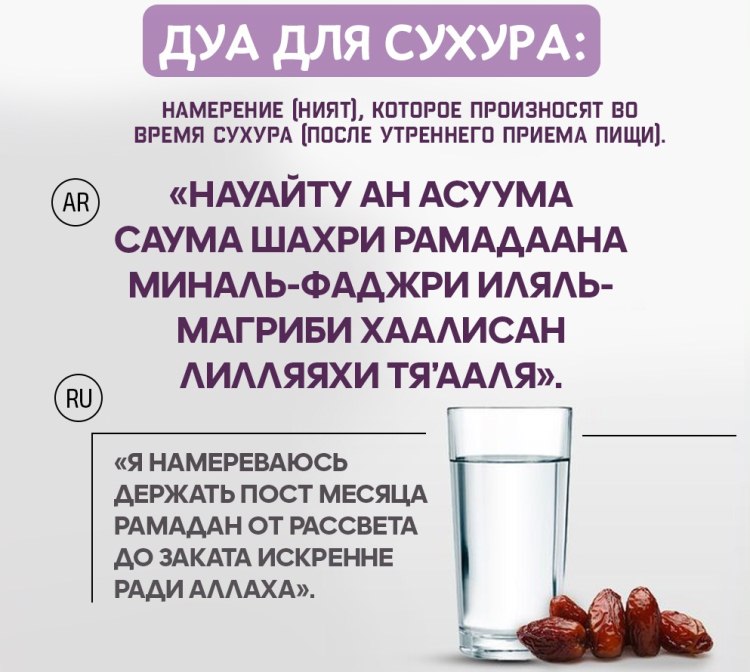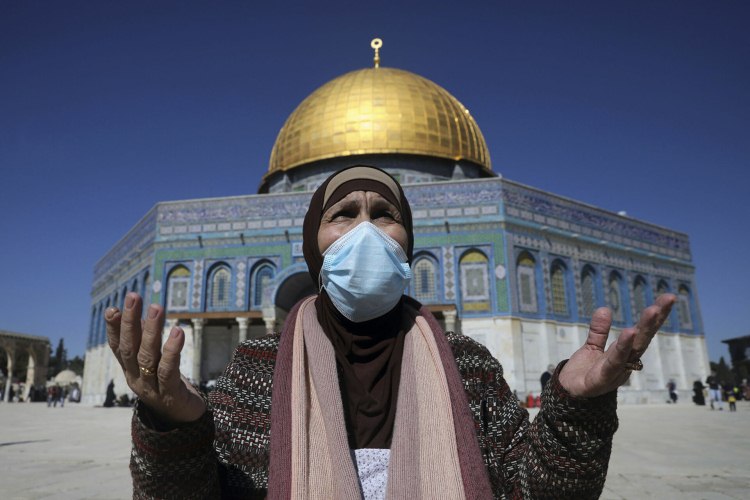Spiritual closeness to God is the main goal of any religion. Such closeness is achieved through prayer, maintaining a righteous lifestyle, and observing fasts.
The main fast for Muslims is the fast in the month of Ramadan. It is during this month that the believer renounces all worldly affairs and devotes himself to reunification with Allah.
Ramadan dates change every year. In order to find out the current Ramadan fasting schedule in 2025 in Moscow, it is recommended to read the article in full. You can also learn about the essence of the holiday, its components and rules of conduct during the fast from the article.
What is Ramadan?

Ramadan is a month of obligatory fasting for MuslimsThere are five pillars of Islam – the basic precepts that constitute the essence of Islam and are obligatory for all Muslims:
- Shahada (testimony of faith) contains two main principles of Islam: faith in one God and recognition of the prophetic mission of the Prophet Muhammad.
- Namaz (prayer). There are 5 obligatory prayers: morning, midday, afternoon, evening and night. The place for prayer must be ritually clean.
- Zakat (alms) - a tax in favor of needy Muslims. It is paid by adult, capable Muslims.
- Hajj (pilgrimage).
- Uraza (fasting). Duration: 29 or 30 days from dawn to sunset. Fasting involves abstaining from food, any drinks, including water. It is also important not to have sexual intercourse. It is recommended to spend the night in meditation and reading the Koran. It is necessary to do godly deeds. If it is impossible to observe the fast due to temporary circumstances, it should be done in any month during the year.
The Essence of Ramadan
The date of the fast's establishment is considered to be 624.The month of Ramadan is a time when Muslims focus on their faith, stepping away from everyday worries.
It is believed that a Muslim's renunciation of everyday household needs will test his faith, demonstrate his self-control and spiritually cleanse a person. Fasting begins in the morning before dawn and ends at sunset.
Fasting rules

During Ramadan, the active life of Muslims shifts to the night.
To observe the fast, a believer must meet the following conditions:
- be of legal age;
- be capable of legal action;
- be healthy.
The post consists of 2 stages:
- The period of abstinence is a time when believers must abstain from food and drink. It begins at sunrise.
- The period of permissibility is the time after sunset and before dawn, when it is permissible to eat and drink.
The diet during the night period is selected depending on the needs of each individual. If a believer is engaged in heavy physical labor, then during meals he must provide himself with a sufficient amount of calories for active work.
It is recommended to eat more fruits and vegetables, fish and cereals, and drink plenty of water.For an evening meal, it is better to choose light food, and for a morning meal, something that takes longer to digest and is more filling, such as meat, nuts, and eggs.
The diet at night should be the same as a person’s in everyday life, however, it is recommended to avoid fatty, spicy, salty foods and large amounts of coffee.
There are two periods for consuming food: suhoor and iftar.
Suhoor

The time before sunrise that is reserved for eating foodAt this time, it is worth eating enough food to stay active throughout the day.
If a Muslim misses the morning meal, he can continue fasting for days; missing the morning meal will not affect the observance of the fast in any way.
Iftar

The time that comes immediately after sunset. When it comes, you must thank Allah and say a prayer. Only then can you start eating. Not observing the conditions of fasting is a great sin for a Muslim.
In addition to abstaining from food, it is recommended to engage in the following good deeds:
- Build good relationships with friends and relatives.
- Devote time daily to reading the Quran and translations of its meanings.
- Play sports and take care of your physical health.
- Think more and be less distracted by everyday entertainment.
- Read books dedicated to improving moral qualities.
- Abstain from sins. Talk less, do not swear or argue. Behave modestly.
How to fast if you have to work during it? Combining fasting and work can be a difficult test. Therefore, it is recommended, if possible, to take a vacation for the last 10 days of the fast, work from home, and sleep during lunch break.
There are a number of categories of believers who may not observe the fast:
- people on the road.
- people who have ongoing health problems or are sick during the fast.
- pregnant and lactating women.
- women during critical days.
- elderly people who are not able to observe the fast.
First day of Ramadan fasting in 2025
The first day of Ramadan 2025 will be on Sunday, March 10.
Last day of Ramadan fasting in 2025
The last day of Ramadan 2025 fasting will be Tuesday, April 9. The end of the fast will be 30 days from the day it began.
What can you do during Ramadan?

During Ramadan 2025 fasting, one must behave piously, however, sometimes the rules of Ramadan are misinterpreted and completely harmless actions are considered violations.
In fact, the following are not considered violations:
- Accidental eating, if a Muslim did it unintentionally and as soon as he came to his senses, he stopped eating. The person can continue fasting, as it is believed that what happened was a treat from Allah.
- Taking a shower, swimming in the sea or pool. There are no restrictions on the use of water, except for drinking it.
- Tasting food while cooking, as long as the person does not swallow it.
- Rinse your mouth and brush your teeth with a small amount of toothpaste.
- Blood donation and other tests.
- Using oil-based perfumes or inhaling incense.
What should not be done in Ramadan?

There are basic prohibitions that a Muslim must observe. During Ramadan fasting in 2025 from beginning to end:
- You must not intentionally eat, drink, take medications, or smoke.
- You cannot have intimate relations with your spouse. Kissing and hugging are allowed, but if there is a suspicion that kissing will lead to intimate relations, then you should also refrain from them during the daytime.
- Vomiting should not be induced unless a person's health is in danger.
If the rules of fasting have been violated, then the believer must spend an additional day of fasting after the end of Ramadan.
It is important to understand that fasting is not a diet, but a period of closeness to God and worship. Therefore, you should not begin it without deep faith and without the desire to observe all the rules of fasting, to do everything "for show". Only sincere worship of Allah will be rewarded to the believer.














Оставить Комментарий